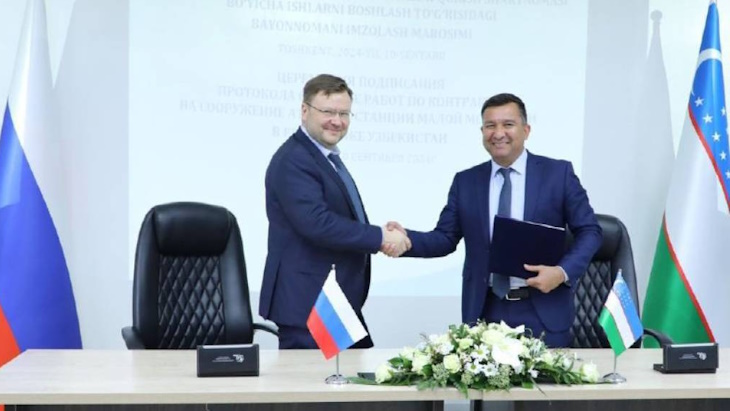The document follows the signature in May of a contract for a six-unit small modular reactor (SMR) nuclear power plant to be built in the Jizzakh region of Uzbekistan, based on the RITM-200N pressurised water reactor. The 55 MW RITM-200N is adapted from the RITM-200 used in Russia's nuclear icebreakers. This is the first export order for the Russian SMR: the first land-based version is currently being built in Yakutia in Russia's Arctic North, aiming for commissioning in 2028.
The latest protocol was signed in the presence of Nikolay Spassky, deputy CEO for International Relations at Rosatom, and Azim Akhmedkhadjayev, director of the UzAtom Atomic Energy Agency.
"Today's signing marks the transition to active work on the implementation of the first LPNPP [low-power nuclear power plant] in Uzbekistan and will allow us to begin direct work at the construction site soon," said Otabek Amanov, director of the Directorate.
Pavel Bezrukov, Atomstroyexport's director of NPP Construction Projects in Central Asia, said the protocol confirms the fulfillment of the priority conditions in terms of regulatory and financial obligations of the parties. "Rosatom's Engineering Division is beginning to actively develop the documentation to obtain a licence for the placement of the LPNPP and survey work at the construction site," he said.
Infrastructure work began at the Jizzakh site in June, with work to set up a rotational camp for plant construction workers beginning in August. This is the first step in the "integrated development" of the area where the plant will operate. Rosatom said: "Cultural, educational projects, medical organisations will appear in the region, and the settlement will attract people to live, industrial companies and commercial organisations to work."





_13505.jpg)
_87975.jpg)
_67826.jpg)
_87695.jpg)





